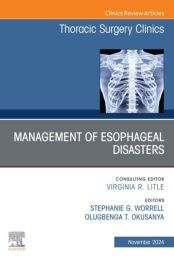Management of Esophageal Disasters, An Issue of Thoracic Surgery Clinics, 1st Edition
In this issue of Thoracic Surgery Clinics, guest editors Drs. Stephanie G. Worrell and Olugbenga T. Okusanya bring their considerable expertise to the topic of Management of Esophageal Disasters. Esophageal surgery can involve complications such as anastomotic leak, pain, bleeding, infection, and reflux. In this issue, top experts discuss the major complications of key thoracic surgeries, and how surgeons can best handle them.
ISBN :
9780443293474
Publication Date :
27-09-2024
In this issue of Thoracic Surgery Clinics, guest editors Drs. Stephanie G. Worrell and Olugbenga T. Okusanya bring their considerable expertise to the topic of Management of Esophageal Disasters. Esophageal surgery can involve complications such as anastomotic leak, pain, bleeding, infection, and reflux. In this issue, top experts discuss the major complications of key thoracic surgeries, and how surgeons can best handle them.
Key Features
- Contains 11 relevant, practice-oriented topics including endoscopic management of iatrogenic perforations; managing pneumediastinum: do they all need a swallow?; complications after paraesophageal hernia repair; perforated esophageal cancers; paraesophageal hernias with perforations; and more.
- Provides in-depth articles on management of esophageal disasters, offering actionable insights for clinical practice.
- Presents the latest information on this timely, focused topic under the leadership of experienced editors in the field. Authors synthesize and distill the latest research and practice guidelines to create clinically significant, topic-based reviews.
Author Information
Edited by Stephanie G. Worrell, Section Chief Thoracic Surgery, Associate Program Director General Surgery, University of Arizona, Tucson, AZ, USA and Olugbenga T. Okusanya, MD, FACS, Thomas Jefferson University, Assistant Professor, Thoracic and Esophageal Surgery, Philadelphia, PA, USA


